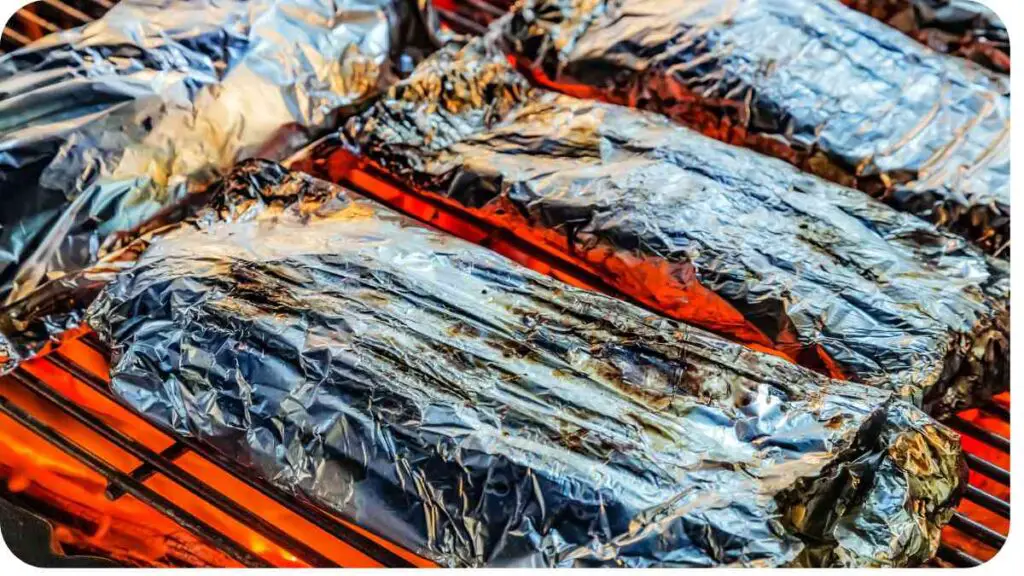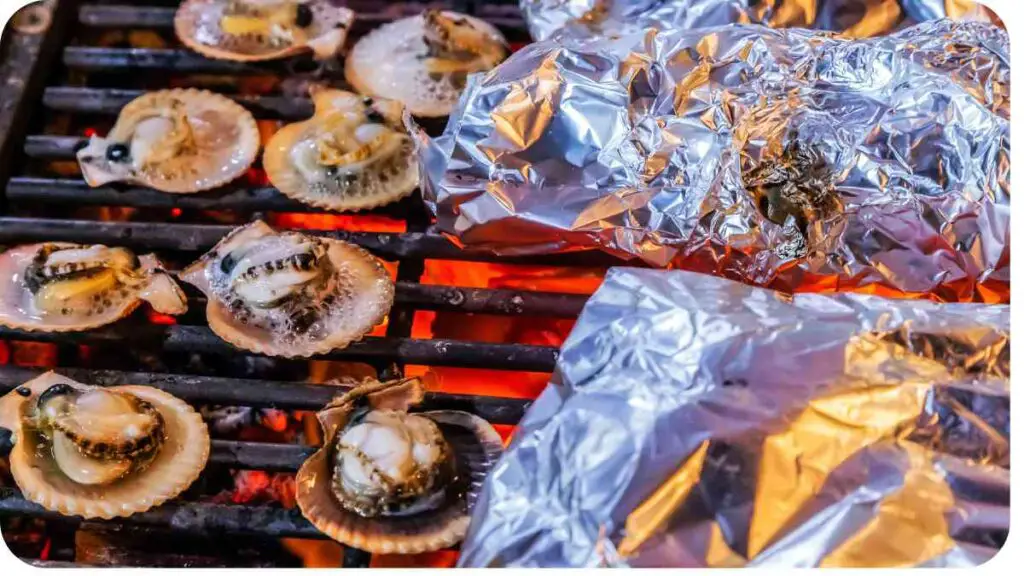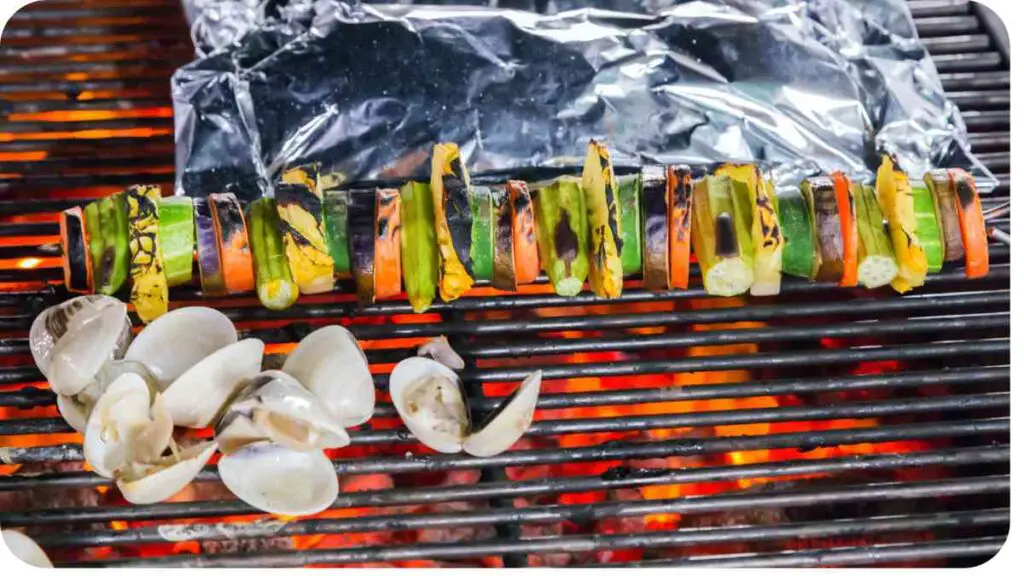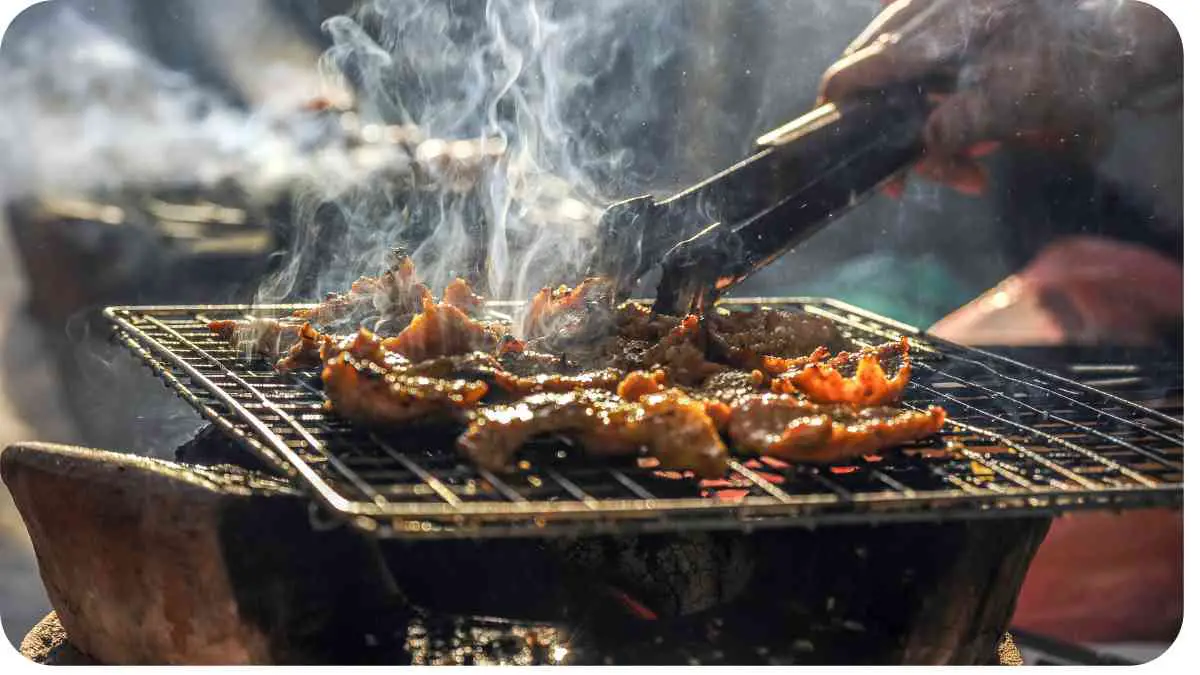Grilling enthusiasts often seek innovative ways to enhance their barbecue experience, and one such method gaining popularity is grilling with aluminum foil. But what exactly is grilling aluminum foil, and how does it work? In this comprehensive guide, we’ll delve into the intricacies of this technique, exploring its benefits, safety considerations, practical tips, and more.
| Key Takeaways |
|---|
| Grilling with aluminum foil offers numerous benefits and conveniences. |
| Aluminum foil acts as a barrier between food and grill grates, preventing sticking. |
| It helps retain moisture and enhances flavor while simplifying cleanup. |
| Safety concerns about aluminum foil leaching into food are minimal. |
| Proper usage and handling ensure delicious and safe grilling results. |
2. What Makes Aluminum Foil Ideal for Grilling?

Aluminum foil is a versatile kitchen essential known for its heat-conductive properties and ability to retain moisture. When used for grilling, aluminum foil acts as a barrier between the food and the grill grates, preventing delicate items from sticking and promoting even cooking. Its lightweight nature makes it easy to handle, while its flexibility allows for customizable wrapping according to the size and shape of the ingredients.
Table: Comparing Safety of Various Grill Wrapping Materials
| Material | Safety Rating | Ease of Use | Cost |
|---|---|---|---|
| Aluminum Foil | High | Easy | Moderate |
| Parchment Paper | Moderate | Moderate | Moderate |
| Butcher Paper | High | Easy | Low |
| Banana Leaves | High | Moderate | Low |
3. Is Grilling with Aluminum Foil Safe?
Safety concerns often arise when using aluminum foil for cooking due to potential leaching of aluminum into food. However, numerous studies have debunked this myth, indicating that the amount of aluminum transferred to food during grilling is negligible and well below safety thresholds set by regulatory agencies.
Table: Advantages of Using Aluminum Foil for Grilling
| Advantages | Description |
|---|---|
| Heat Conduction | Aluminum foil efficiently conducts heat, ensuring even cooking and preventing hot spots on the grill. |
| Moisture Retention | By sealing in moisture, aluminum foil helps preserve the juiciness and tenderness of grilled foods, preventing them from drying out. |
| Easy Cleanup | Grilling with aluminum foil minimizes mess by containing drippings and preventing flare-ups, simplifying post-cooking cleanup. |
| Versatility | Aluminum foil can be molded to fit various shapes and sizes, making it suitable for wrapping different types of ingredients on the grill. |
| Flavor Infusion | Foil packets create a sealed environment that allows flavors to mingle, resulting in enhanced taste profiles and aroma. |
4. Benefits of Grilling with Aluminum Foil

Grilling with aluminum foil offers a plethora of benefits that elevate the cooking experience and produce mouthwatering results. Let’s delve deeper into some of these advantages:
- Heat Conduction: Aluminum foil efficiently conducts heat, ensuring even cooking and preventing hot spots on the grill. This means your food cooks evenly, reducing the risk of undercooked or overcooked sections.
- Moisture Retention: One of the most significant advantages of using aluminum foil is its ability to seal in moisture. This helps preserve the natural juices of the ingredients, resulting in succulent, tender grilled dishes.
- Easy Cleanup: Grilling can be messy, but aluminum foil simplifies the cleanup process. By containing drippings and preventing flare-ups, foil minimizes the mess on your grill grates, making post-cooking cleanup a breeze.
- Versatility: Aluminum foil is incredibly versatile and can be molded to fit various shapes and sizes. Whether you’re grilling delicate fish fillets, hearty vegetables, or marinated meats, foil allows for customized wrapping, ensuring optimal cooking conditions for each ingredient.
- Flavor Infusion: When you grill with aluminum foil, you create a sealed environment that allows flavors to mingle and intensify. This results in enhanced taste profiles and aromatic dishes that are sure to tantalize your taste buds.
Table: Dos and Don’ts of Grilling with Aluminum Foil
| Dos | Don’ts |
| Preheat your grill before placing foil packets. | Don’t use aluminum foil with acidic foods like tomatoes or citrus fruits, as it can react and affect the taste. |
| Use heavy-duty aluminum foil for durability and heat resistance. | Avoid wrapping foods too tightly in foil, as it may inhibit airflow and affect cooking. |
| Seal foil packets securely to prevent leaks and retain moisture. | Don’t place aluminum foil directly on the grill grates without food on top, as it can cause flare-ups. |
| Monitor cooking times closely to prevent overcooking or burning. | Avoid piercing foil packets while grilling, as it can cause juices to escape and lead to dryness. |
| Experiment with different ingredients and seasonings for diverse flavors. | Don’t forget to allow foil packets to cool before handling to avoid burns. |
5. Tips for Using Aluminum Foil on the Grill
Grilling with aluminum foil can be a game-changer, but it’s essential to employ the right techniques for optimal results. Here are some valuable tips to enhance your foil-wrapped grilling experience:
- Choose the Right Foil: Opt for heavy-duty aluminum foil to withstand the heat of the grill and prevent tearing or puncturing. Thicker foil ensures durability and maintains the integrity of your foil packets during cooking.
- Double-Layer for Durability: For added protection and stability, consider double-layering your aluminum foil when wrapping ingredients. This extra layer helps prevent tearing and enhances heat retention for more consistent cooking.
- Create Proper Seals: To prevent leaks and retain moisture, ensure that your foil packets are tightly sealed. Crimp the edges securely to create a tight seal, but leave a bit of room for air circulation within the packet to facilitate even cooking.
- Oil or Non-Stick Spray: To prevent sticking and facilitate easy removal of food from the foil, lightly coat the inner surface with cooking oil or non-stick spray before adding ingredients. This step helps maintain the integrity of delicate foods and ensures effortless cleanup.
- Monitor Cooking Times: Keep a close eye on the cooking progress to avoid overcooking or burning. Since foil packets can trap heat and moisture, foods may cook faster than when exposed directly to the grill. Adjust cooking times accordingly to achieve the desired level of doneness.
Table: Common Mistakes to Avoid When Grilling with Aluminum Foil
| Mistakes | Description |
|---|---|
| Overlapping Foil | Overlapping foil layers can inhibit airflow and affect cooking, leading to unevenly cooked or soggy ingredients. |
| Using Thin Foil | Thin foil is more prone to tearing and may not provide adequate protection or heat retention for optimal grilling. |
| Neglecting Air Vents | Failing to leave space for air circulation within foil packets can impede cooking and result in unevenly cooked food. |
| Insufficient Sealing | Improperly sealed foil packets can leak juices and moisture, resulting in dry or undercooked ingredients. |
| Overcrowding Foil Packets | Overloading foil packets with too many ingredients can impede heat circulation and lead to uneven cooking. |
6. Common Mistakes to Avoid When Grilling with Aluminum Foil
While grilling with aluminum foil is relatively straightforward, there are some common mistakes that even seasoned grillmasters can make. By being aware of these pitfalls, you can ensure that your foil-wrapped grilling endeavors yield flawless results every time.
- Overlapping Foil: When creating foil packets, avoid overlapping the foil layers excessively. Overlapping can restrict airflow within the packet, leading to uneven cooking or soggy ingredients. Instead, use a single, large piece of foil to wrap your ingredients, ensuring proper heat distribution.
- Using Thin Foil: Thin aluminum foil is more prone to tearing and may not provide sufficient protection or heat retention during grilling. Opt for heavy-duty foil to ensure durability and optimal cooking conditions for your ingredients.
- Neglecting Air Vents: It’s essential to leave space for air circulation within foil packets to facilitate even cooking. Failure to do so can result in unevenly cooked food, with some portions remaining undercooked while others are overdone. Create small vents or openings in the foil to allow steam to escape and heat to circulate effectively.
- Insufficient Sealing: Properly sealing foil packets is crucial for preventing leaks and retaining moisture. Be diligent when crimping the edges of the foil to ensure a tight seal, especially when dealing with juicy or saucy ingredients. Any gaps or openings in the foil can lead to moisture loss and dry, unappetizing results.
- Overcrowding Foil Packets: While it may be tempting to pack as many ingredients as possible into a single foil packet, overcrowding can hinder heat circulation and impede the cooking process. It’s best to distribute ingredients evenly and avoid overcrowding to ensure thorough and consistent cooking.
Table: Delicious Recipes for Grilling with Aluminum Foil
| Recipe | Description |
|---|---|
| Grilled Garlic Butter Shrimp Foil Packets | Succulent shrimp marinated in garlic butter and herbs, wrapped in foil packets and grilled to perfection. |
| Foil-Wrapped BBQ Chicken | Tender chicken breasts smothered in tangy barbecue sauce, sealed in foil packets and grilled to juicy perfection. |
| Vegetable Medley Foil Packs | A colorful assortment of fresh vegetables seasoned with herbs and spices, wrapped in foil and grilled to vibrant perfection. |
| Citrus Salmon with Asparagus | Flaky salmon fillets infused with zesty citrus flavors, paired with tender asparagus spears and grilled to perfection in foil packets. |
7. Delicious Recipes for Grilling with Aluminum Foil
Ready to elevate your grilling game with some tantalizing recipes? These foil-wrapped creations are sure to impress your guests and tantalize your taste buds.
- Grilled Garlic Butter Shrimp Foil Packets
- Succulent shrimp marinated in garlic butter and herbs, wrapped in foil packets and grilled to perfection. These flavorful shrimp packets are quick to prepare and bursting with savory goodness.
- Foil-Wrapped BBQ Chicken
- Tender chicken breasts smothered in tangy barbecue sauce, sealed in foil packets, and grilled to juicy perfection. This classic barbecue favorite is easy to make and perfect for summer cookouts.
- Vegetable Medley Foil Packs
- A colorful assortment of fresh vegetables seasoned with herbs and spices, wrapped in foil, and grilled to vibrant perfection. These veggie foil packs make a delicious and nutritious side dish or vegetarian main course.
- Citrus Salmon with Asparagus
- Flaky salmon fillets infused with zesty citrus flavors, paired with tender asparagus spears, and grilled to perfection in foil packets. This elegant yet effortless dish is perfect for special occasions or weeknight dinners.
Table: Cleaning and Maintaining Your Grill Foil
| Cleaning Method | Description |
|---|---|
| Scrubbing with a Grill Brush | Use a grill brush to scrub off any food residue or debris stuck to the aluminum foil. Rinse thoroughly with water. |
| Soaking in Soapy Water | For stubborn stains or buildup, soak the aluminum foil in warm, soapy water for a few minutes before scrubbing. |
| Baking Soda Paste | Make a paste using baking soda and water, then apply it to the foil and scrub gently to remove tough stains. |
| Vinegar Solution | Mix equal parts vinegar and water, then spray or wipe the solution onto the foil and scrub with a brush or sponge. |
8. Cleaning and Maintaining Your Grill Foil

After a successful grilling session with aluminum foil, it’s essential to properly clean and maintain your grill foil for future use. Follow these simple steps to keep your foil in top condition:
- Scrubbing with a Grill Brush: Use a grill brush to scrub off any food residue or debris stuck to the aluminum foil. Gently brush the surface of the foil, paying particular attention to areas with stubborn buildup.
- Soaking in Soapy Water: For tougher stains or persistent buildup, soak the aluminum foil in warm, soapy water for a few minutes. This helps loosen the grime, making it easier to remove during the cleaning process.
- Baking Soda Paste: For particularly stubborn stains, create a paste using baking soda and water. Apply the paste to the affected areas of the foil and scrub gently with a sponge or brush. The abrasive nature of baking soda helps lift tough stains without damaging the foil.
- Vinegar Solution: Vinegar is a natural cleaning agent that can help dissolve grease and grime. Mix equal parts vinegar and water in a spray bottle or container, then apply the solution to the foil. Allow it to sit for a few minutes before scrubbing with a brush or sponge.
By incorporating these cleaning methods into your routine, you can ensure that your grill foil remains in pristine condition, ready for your next grilling adventure.
Table: Environmental Impact of Aluminum Foil
| Environmental Factor | Impact |
|---|---|
| Resource Extraction | Aluminum foil production requires extraction of bauxite ore, leading to habitat destruction. |
| Energy Consumption | Manufacturing aluminum foil consumes significant energy, contributing to carbon emissions. |
| Recycling Potential | Aluminum foil is highly recyclable, with recycling rates surpassing other packaging materials. |
| Landfill Waste Reduction | Recycling aluminum foil reduces the volume of waste sent to landfills, minimizing environmental impact. |
9. Environmental Impact of Aluminum Foil
While aluminum foil is a convenient and versatile material for grilling, it’s essential to consider its environmental impact. Here’s a closer look at how aluminum foil production and disposal affect the environment:
- Resource Extraction: The production of aluminum foil begins with the extraction of bauxite ore, which can lead to habitat destruction and ecosystem disruption in mining areas. This process has implications for biodiversity and landscape conservation.
- Energy Consumption: Manufacturing aluminum foil requires significant energy input, contributing to carbon emissions and environmental degradation. The energy-intensive nature of aluminum production underscores the importance of energy efficiency and sustainable practices in the industry.
- Recycling Potential: One positive aspect of aluminum foil is its high recyclability. Aluminum can be recycled indefinitely without losing quality, making it a valuable resource in the circular economy. Recycling aluminum foil helps conserve natural resources and reduce the need for virgin materials.
- Landfill Waste Reduction: By recycling aluminum foil instead of sending it to landfills, we can reduce the volume of waste and minimize environmental impact. Aluminum foil disposed of in landfills contributes to methane emissions and takes up valuable space, exacerbating waste management challenges.
Conclusion
Grilling with aluminum foil offers numerous benefits, from enhanced flavor and moisture retention to easy cleanup and versatility. By following best practices and avoiding common mistakes, you can unlock the full potential of aluminum foil for your grilling adventures. Remember to prioritize safety, sustainability, and deliciousness in every foil-wrapped creation, and enjoy the culinary delights that await on your grill.
Whether you’re a seasoned grill master or a novice outdoor cook, aluminum foil can elevate your grilling experience to new heights. So fire up the grill, grab your foil, and let the sizzling sounds and mouth watering aromas transport you to culinary bliss.
Happy grilling!
Further Reading
- Grilling in Foil: The Easy Way to Grill (Food Network): Explore this article for tips and tricks on grilling with foil, making your outdoor cooking experience a breeze.
- Using Foil on Your Grill (Weber): Weber shares insights into the proper usage of foil on your grill, ensuring delicious results every time.
- No Worries When Barbecuing with Aluminium (alufoil.org): Learn more about the safety and benefits of using aluminum foil for barbecuing, debunking common misconceptions.
FAQs
Is grilling with aluminum foil safe?
Grilling with aluminum foil is considered safe, as numerous studies have shown that the amount of aluminum transferred to food during grilling is negligible.
Can I reuse aluminum foil for grilling?
While it’s possible to reuse aluminum foil for grilling, it’s essential to inspect it for tears or damage before each use to ensure optimal performance and safety.
How should I clean aluminum foil after grilling?
To clean aluminum foil after grilling, scrub off any food residue with a grill brush or sponge, then rinse it thoroughly with water. For tougher stains, you can soak the foil in warm, soapy water before cleaning.
What types of foods are suitable for grilling with aluminum foil?
Aluminum foil is versatile and can be used to grill a wide variety of foods, including vegetables, seafood, poultry, and even desserts. However, it’s best to avoid acidic foods like tomatoes or citrus fruits, as they can react with the foil.
Can aluminum foil be recycled after use?
Yes, aluminum foil is highly recyclable. Make sure to clean off any food residue before recycling, and check with your local recycling facility for specific guidelines on aluminum foil recycling.

I am Hellen James, a landscape architect. For many years I have written about landscaping for various publications; however, recently decided to focus my writing on personal experience as a profession.

